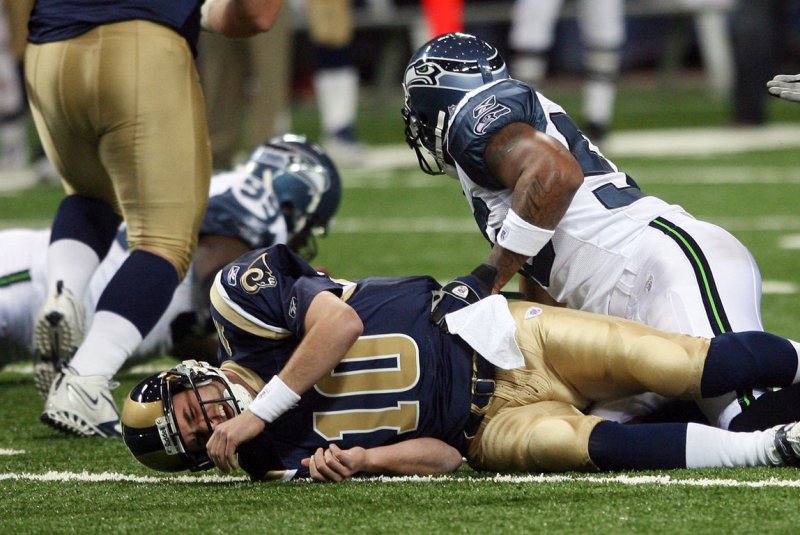St. Louis Rams quarterback Marc Bulger lays on the turf with a concussion after being sacked against the visiting Seattle Seahawks on November 25, 2007. File photo by Bill Greenblatt/UPI |
License Photo
Jan. 18 (UPI) -- Researchers reported Thursday that repeated hits to the head, including in sports and on the battlefield, lead to chronic traumatic encephalopathy, or CTE -- even without a concussion.
The team, led by Dr. Lee Goldstein, published the findings in the journal Brain after a seven-year study. Researchers from Boston University, where Goldstein works, as well as scientists from the Cleveland Clinic, Harvard Medical School, Lawrence Livermore National Laboratory in California, Ben-Gurion University in Israel and Oxford University contributed to the study.
A number of high-profile athletes have developed the Alzheimer's-like disease but it's also been found in service members hurt in roadside bombs and other blasts.
"Most hits to the head are not concussive... but no one is paying any attention to them," Goldstein said in a CNN report.
About 20 percent of known cases of CTE had no record or report of concussion, Goldstein said.
"Collectively, these results raise concern that repetitive neurotrauma, independent of concussion, may induce early CTE brain pathologies, even in teenagers and young adults," reseachers wrote in the study. "Cumulative exposure to such injuries may also increase risk for other tau protein neurodegenerative diseases, including Alzheimer's disease. These considerations are important not only for understanding and differentiating concussion, TBI, and CTE, but also to inform clinical practice, return-to-play protocols and public health policy."
Goldstein said that concussion itself is not the injury, but instead symptoms experienced from injury, including memory impairment or loss of balance. He said, "by looking at concussion, it's not telling you anything about the brain or CTE."
"We've had an inkling that subconcussive hits -- the ones that don't [show] neurological signs and symptoms -- may be associated with CTE," Goldstein told NPR. "We now have solid scientific evidence to say that is so."
The researchers examined the brains of four athletes, ages 17 and 18 years old, after receiving a sports-related head injury. These brains had shown signs of CTE, including leaky blood vessels and abnormal buildups of the protein tau, as soon as 24 hours after injury.
They compared the brains with four other athletes of similar age without any recent head trauma before death. These had no changes in their pathology compared with those with the hits.
"We're seeing the earliest pathology soon after one of these injuries," Goldstein said.
The researchers also studied mice with repeated head trauma. They found the mice exposed to the head trauma still exhibited changes in the brain even without a concussion.
"CTE develops early, soon after injury," Goldstein said. "It doesn't take years, or decades. It starts early. It persists. And all of our evidence to date shows it's progressive."
Previously, the Boston University's CTE Center found that 110 of 111 former NFL players whose brains were donated for study had been diagnosed with the disease. But many of the studied brains came from players who experienced clinical CTE symptoms when alive.
The only way right now to diagnose CTE is by an autopsy.
"I think [this research] really reinforces, as we have suspected, [the idea] that it's not concussion per se, it's the exposure to multiple head impacts," Dr. Julian Bailes, the director of neurosurgery and co-director of NorthShore University HealthSystem Neurological Institute in Chicago, told CNN.















